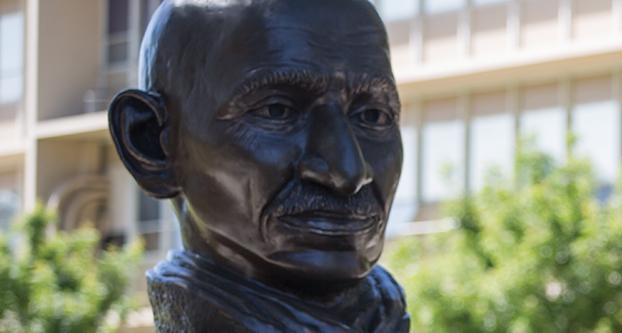By Dr. Sudarshan Kapoor
Professor Emeritus of Social Work Education
“Generations to come will scarce believe that such a one as this ever in flesh and blood walked upon this earth.” – Albert Einstein
Mahatma Gandhi, the great spiritual, social and political leader of India, is considered the most revered figure of the 20th century. He still is and will remain so because of his message of peace, love and the universal relevance of the principle of nonviolence.
In 1964, Thomas Merton, a renowned Trappist monk and author, singled out Gandhi “as a great leader, one of the noblest men of our century, because he was truly and sincerely committed to peace politics. Gandhi’s life was marked by wholeness and wisdom, an integrity and spiritual consistency.”
Gandhi was a bridge between humanity and spirituality. Recognizing his immense contribution to peace and freedom struggles across the world, human rights and novel method of mass nonviolent resistance (Satyagraha) to fight oppression, the United Nations General Assembly on June 15, 2007 designated Oct. 2, Gandhi’s birthday, as International Day of Nonviolence which is now observed by 193 member nations.
Gandhi, who led India to achieve its independence through nonviolent means from British rule in 1947, influenced and inspired many minds and leaders like Rev. Dr. Martin Luther King Jr, Nelson Mandela, Dalai Lama, Cesar E. Chavez, Lech Walesa, Aung San Su Kyi and others who carried their struggles based on the philosophy of nonviolence.
His moral and novel methods brought down colonialism, imperialism and dictatorships and strengthened the roots of popular sovereignty of civil, political and economic rights.
He is regarded as the father of the human rights movement of the 20th century and the patron saint of peace and environmental justice oriented struggles of the modern era. The original phase of Arab Spring and the Occupy Wall Street movement in the U.S. got inspiration from Gandhi and used nonviolent tactics in their overall approach.
Though born in India on Oct. 2, 1869, and known as the Father of the Indian Nation, Gandhi really belongs to the whole humanity because of the universality of his message and teachings which have special significance and relevance in today’s troubled world mired in religious hatred, political division, racial prejudice and human exploitation.
Dr. King spoke of Gandhi: “Gandhi was inevitable. If humanity is to progress, Gandhi is inescapable. He lived, thought and acted, inspired by the vision of humanity evolving toward a world of peace and harmony. We may ignore him at our own risk.”
Though Gandhi’s birthday has now become an international observance, Fresno State has been commemorating his birthday since 1990 with a powerful message of “Stop the Hate, Stop the Violence, Build a Culture of Peace.”
This year, the 25th anniversary of that Gandhi Memorial Dedication will be observed. In his proclamation, Dr. Joseph Castro, President of Fresno State, declared that our campus community would join the world community to honor Mahatma Gandhi on his 146th birthday on Friday with a candlelight vigil for world peace and through the community celebration which starts at 6:30 p.m. in the Peace Garden.
The celebration at Fresno State includes a garlanding and flower ceremony, musical tribute, cultural dances, guided meditation and a pledge against hate. Many community and civic leaders have been invited.
Join us to celebrate the life and legacy of Mahatma Gandhi on his 146th birthday. Mahatma Gandhi is also known as the patron saint of the peace movement and father of the human rights movement in the 20th century. Admission is free. Parking is relaxed.
Call (559) 435-2212 or (559) 862-9663 or (559) 223-4133 for additional information.




